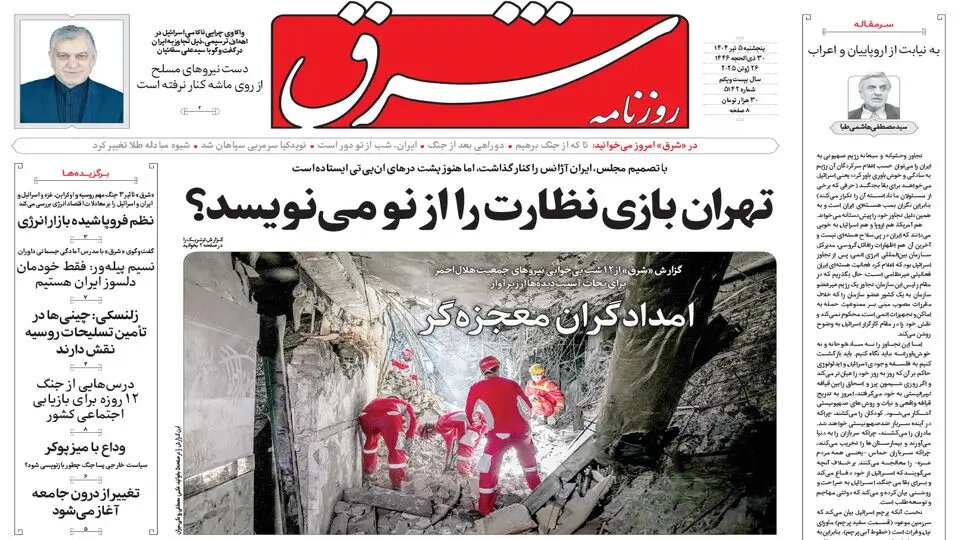The shadow of war and peace over the Middle East

TEHRAN - In a note, Shargh addressed the current situation in the Middle East and wrote: Following the unprecedented U.S. attacks on Iran's nuclear facilities, the world is facing a wave of contradictory analyses, narratives, and reactions.
This operation not only changed the security equations in the Middle East but also marked the beginning of a new chapter in the battle of narratives in the global media. Meanwhile, media close to the Democrats, repeating their usual pattern, sacrificed political orientations for the existing reality. With the end of the twelve-day war and the declaration of a ceasefire, the Middle East has entered a new chapter. However, the scars of this event and the fear of a repeat of the conflict continue to cast a shadow over the region. Rebuilding Iran's nuclear facilities, at best, requires years and billions of dollars of investment, and this country will undoubtedly redefine its nuclear and regional policies. Finally, the massive U.S. attacks on Iran's nuclear facilities are a turning point in the geopolitical and security equations of the Middle East, an event that its effects will cast a shadow on developments in the region and the world for years to come.
Etemad: Strong Iran
In an analysis, Etemad discussed the failure of the Western plan and said: The West foolishly thought that the Iranian nuclear industry, which is the product of the Iranians' inherent knowledge, could be destroyed through a military attack, but the West faced defeat in its last option against Iran. The West wanted to try its last chance to topple Iran before officially accepting Iranian power again. In other words, as their last chance, the West decided that before any deal with Iran, to mobilize all their capabilities, including a military might, to overthrow the Iran’s ruling system and prevent it from becoming a nuclear power, because according to all their internal and external information and evidence, only a military attack could have “finished Iran”. But strangely and surprisingly, everything turned out the other way around. Contemporary history and historical experience have demonstrated that the West's political class consistently acts against the East. The West has repeatedly behaved deceitfully, employing comprehensive pressure to eliminate competitors in the East.
Kayhan: The failure of the American project
In a commentary, Kayhan analyzed the United States’ failed project against Iran: The United States and its allies have repeatedly tested the maximum pressure strategy against Iran, from crippling economic sanctions to the assassination of nuclear scientists and cyber-attacks. But these policies have not only ended in failure, but also led to the strengthening of self-sufficiency, increased tolerance, and the development of Iran's deterrent capabilities. Also, contrary to the expectations of the invaders, the attack on Iran did not cause internal unrest or public riots. On the contrary, many segments of the society, regardless of their political or ideological affiliations, viewed foreign aggression as a threat to national sovereignty. The result was the formation of unity and solidarity against the common enemy. In addition to military attacks, by highlighting the son of the deposed king of the Pahlavi regime, the Western and Israeli propaganda machines tried to nominate him as an option for the post-Islamic Republic. But the Iranians rebuffed the project.
Arman-e-Emrooz: Golden economic opportunity in shadow of peace
In an article, Arman-e-Emrooz examined the prospect of financial markets in Iran and the Middle East. It quoted economist Morteza Afghah as saying: Financial markets in Iran and the Middle East were severely affected following the announcement of a ceasefire between Iran and Israel. The prospect of global and regional markets created a continuous and fragile political-economic ceasefire, with a tangible impact on markets. The “political ceasefire” provided a temporary opportunity to reduce tension and the relative revival of markets. The current political ceasefire can be a starting point for relative stability in the oil market, foreign currency, gold, and capital market. But economic, structural, and governance reforms, along with lifting sanctions and establishing constructive relationships with the world, are preconditions to overcome the crisis. Without these reforms, no ceasefire will last, and the country will be far from the path of economic development.
Leave a Comment